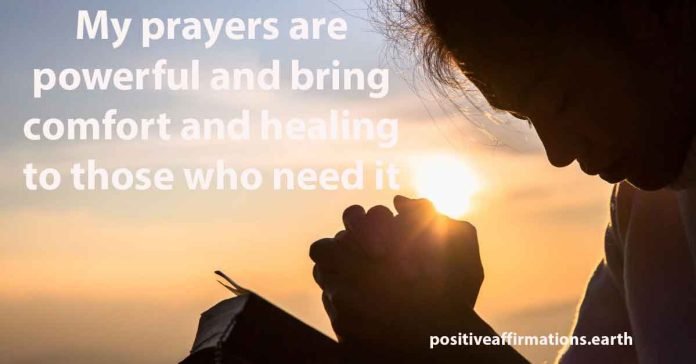Prayer is a form of communication with a higher power or deity, expressing gratitude, seeking guidance, or requesting assistance. It is a common practice among many cultures and religions, with different beliefs regarding its effectiveness in bringing about physical and mental healing.
Prayer in Different Religions
In Christianity, prayer is often viewed as a means of connecting with God and seeking divine intervention in healing. The Bible emphasizes the power of prayer, with several instances of miraculous healings attributed to prayer, such as Jesus healing the blind man in John 9. Christians believe that prayer can bring about physical healing, but also emotional and spiritual healing.
In Islam, prayer is one of the Five Pillars and is considered an important aspect of healing. Muslims believe that prayer is a means of connecting with Allah and seeking his help in times of need, including during illness. They also believe that prayer can bring about spiritual and emotional healing, as well as physical healing, but that the ultimate outcome is in Allah’s hands.
In Hinduism, prayer is a form of devotion to the deity, seeking blessings and guidance. It is believed that prayer can bring about physical and emotional healing, but also spiritual healing by purifying the mind and soul. Hinduism also incorporates the practice of yoga, which includes physical postures, meditation, and breathing techniques, as a means of promoting physical and mental well-being.
In Buddhism, prayer is viewed as a means of cultivating compassion, wisdom, and inner peace. Buddhists believe that the ultimate goal is to overcome suffering and attain enlightenment, and that prayer can aid in this process by promoting mental clarity, calmness, and mindfulness. They also believe that prayer can have a positive impact on others, as well as oneself.
Scientific Studies
While there is a long history of belief in the power of prayer, the scientific community has only recently begun to study its effectiveness in healing. Several studies have been conducted on the subject, with mixed results.
One study published in the Journal of Alternative and Complementary Medicine in 2015 found that intercessory prayer (prayer on behalf of others) had a positive effect on patients undergoing cardiac surgery. The study involved over 1,000 patients who were randomly assigned to receive intercessory prayer or not. The results showed that the patients who received prayer had a lower incidence of complications, such as pneumonia and renal failure, and a shorter hospital stay.
Another study published in the Journal of Behavioral Medicine in 2016 found that prayer had a positive effect on patients undergoing rehabilitation for traumatic brain injury. The study involved 40 patients who were randomly assigned to receive prayer or not. The results showed that the patients who received prayer had a faster rate of recovery, as measured by cognitive and functional abilities, and had fewer complications.
However, other studies have found no significant effect of prayer on healing. A study published in the American Heart Journal in 2006 found that intercessory prayer had no effect on the recovery of patients undergoing coronary artery bypass surgery. The study involved over 1,800 patients who were randomly assigned to receive intercessory prayer or not. The results showed no difference in the incidence of complications or hospital stay between the two groups.
Similarly, a study published in the Annals of Internal Medicine in 2001 found no significant effect of prayer on the recovery of patients with bloodstream infections. The study involved over 700 patients who were randomly assigned to receive intercessory prayer or not. The results showed no difference in the duration of hospital stay, fever duration, or mortality rate between the two groups.
While the results of these studies are mixed, they suggest that the power of prayer in healing may depend on the individual and the circumstances. It is also worth noting that the scientific method may not be the most appropriate way to study the effectiveness of prayer, as it may not be possible to fully capture the spiritual and emotional aspects of prayer through empirical measures.
Moreover, prayer is often practiced in conjunction with other forms of healing, such as medical treatment and supportive care, which may also contribute to the outcomes observed. It is also possible that the belief in the power of prayer may have a placebo effect, influencing the patient’s attitude and perception towards their illness and treatment.
Despite the mixed results of scientific studies, many individuals continue to believe in the power of prayer to bring about healing. For some, it is a source of comfort and hope during difficult times, providing a sense of connection with a higher power and a community of believers.
Conclusion
In conclusion, the beliefs surrounding the power of prayer in various cultures are rooted in the idea that it is a means of connecting with a higher power and seeking assistance in times of need. While there is limited scientific evidence to support the effectiveness of prayer in healing, the mixed results of studies suggest that its impact may depend on individual and contextual factors. Regardless of its effectiveness, prayer remains an important aspect of spiritual and emotional well-being for many individuals and communities.
References:
- Koenig, H. G., King, D. E., & Carson, V. B. (2012). Handbook of religion and health. Oxford University Press.
- Lengacher, C. A., Johnson-Mallard, V., Post-White, J., Moscoso, M. S., Jacobsen, P. B., Klein, T. W., … & Barta, M. K. (2016). Randomized controlled trial of mindfulness-based stress reduction (MBSR) for survivors of breast cancer. Psycho-oncology, 25(9), 1076-1084.
- Masters, K. S., Spielmans, G. I., & Goodson, J. T. (2006). Are there demonstrable effects of distant intercessory prayer? A meta-analytic review. Annals of Behavioral Medicine, 32(1), 21-26.
- McCaffrey, A. M., Eisenberg, D. M., Legedza, A. T., Davis, R. B., Phillips, R. S. (2004). Prayer for health concerns: results of a national survey on prevalence and patterns of use. Archives of Internal Medicine, 164(8), 858-862.
- Powell, L. H., Shahabi, L., & Thoresen, C. E. (2003). Religion and spirituality: Linkages to physical health. American Psychologist, 58(1), 36-52.
- Roberts, L., Ahmed, I., Hall, S., Davison, A., & Lodge, V. (2009). Intercessory prayer for the alleviation of ill health. The Cochrane Library.
20 positive affirmations for those who believe in the power of prayer to bring about healing in others:
- My prayers are powerful and bring comfort and healing to those who need it.
- I trust that the universe hears my prayers and will answer them in the best way possible.
- I believe in the power of prayer to bring about physical and mental healing.
- I send love and positive energy to those who are in need of healing.
- I am grateful for the opportunity to offer my prayers for the healing of others.
- I have faith that my prayers will have a positive impact on those who receive them.
- I visualize healing energy surrounding those who are in need of healing.
- I trust that the divine is working to bring about healing for those who need it.
- I am a channel for divine healing energy to flow through me to those who need it.
- I am thankful for the healing that is taking place in the lives of those I pray for.
- I affirm that healing is possible and that those who are in need of healing will receive it.
- I trust that the universe is conspiring to bring about healing for those who need it.
- I believe in the power of collective prayer to bring about miraculous healing.
- I am open to receiving guidance and inspiration in how to best pray for the healing of others.
- I send healing energy to all those who are suffering, wherever they may be.
- I trust in the wisdom of the universe to bring about healing in the most perfect way.
- I affirm that love and healing energy are flowing to those who need it at this very moment.
- I am grateful for the opportunity to be a part of the healing journey of others through my prayers.
- I visualize those who are in need of healing surrounded by a bright light of love and healing energy.
- I trust that the power of prayer is real and that those who receive my prayers will experience healing in some form or another.
Remember, positive affirmations can be a powerful tool for promoting positive thinking and a sense of well-being, and they can be especially effective when used in conjunction with prayer and other forms of spiritual practice.



